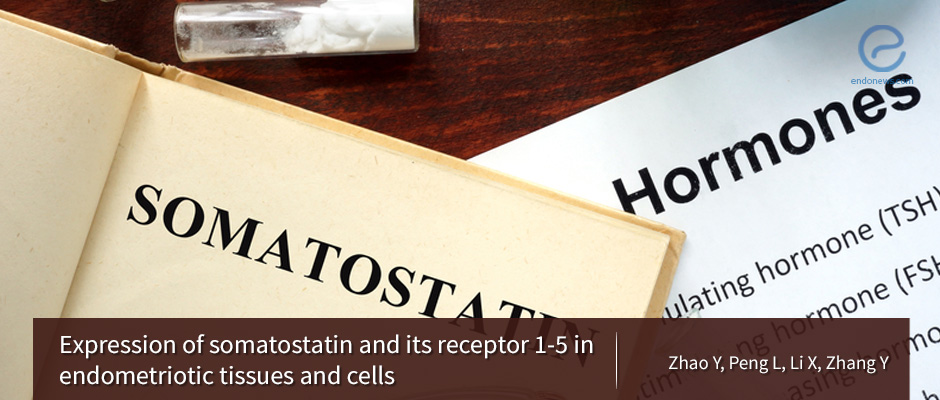Growth Hormone-Inhibiting Hormone: Somatostatin and its receptors in endometriosis
Dec 12, 2018
Somatostatin and receptors in endometriosis, novel findings from surgical specimens with an impact on future clinical approaches
Key Points
Highlights:
- The expression of the somatostatin receptor (1‑5) was higher both in the eutopic and the ectopic endometrium of endometriosis patients, compared to those in the normal endometria. Furthermore, the expression of all the subtypes of somatostatin receptors in the ectopic endometrial tissues was closely associated with the stage of endometriosis.
Importance:
- Somatostatin inhibits the proliferation of tumor cells by binding to specific cell surface receptors in a wide variety of tumors including endometrial and ovarian cancer.
- However, the expression of somatostatin and its receptors are not well known in endometriosis.
What's done here:
- The present study was designed to detect the expression of the SS and SSTR1‑5 genes in endometriotic tissues and association with the disease, using endometriotic tissues from 30 patients during endometriosis surgery
- Somatostatin gene expression was assessed by RT-qPCR, and the expression of somatostatin receptors (SSTR1‑5) was determined by immunohistochemistry in the ectopic, eutopic endometria and in controls; then the association with endometriosis staging was examined.
Key Results:
- The expression of somatostatin mRNA in endometriosis cells was significantly higher compared with the normal endometrial cells.
- The immunohistochemical findings indicated that somatostatin receptors (SSTR1‑5) were expressed in endometriotic tissues at a higher rate and were significantly associated with the clinical endometriosis stage of the patients.
- However, this was in contrast with previous studies by other researchers.
- Authors hypothesized that the difference may be due to the different clinical samples and populations, which require more studies for confirmation.
Lay Summary
Yanhua Zhao and colleagues, led by Dr.Zhang from Hunan, China reported their recent research at Experimental and Therapeutic Medicine.
Somatostatin is a natural polypeptide extensively distributed in the digestive and nervous system, exhibiting several biological effects with a restricted clinical application due to its short half‑life in vivo. The somatostatin analog (SSTA) is advantageous due to its long half‑life, relatively long‑lasting effect, high selectivity and the ease of application.
Previous studies had revealed that somatostatin inhibits the proliferation of tumor cells by binding to specific cell surface receptors, subtypes named as somatostatin receptor 1 to 5. Somatostatin receptors exist in a wide variety of tumors and some studies have reported their expression in endometrial and ovarian cancer as well.
Few studies have focused on the expression of somatostatin and its receptors in endometriosis. The present study was designed to detect the somatostatin and its receptors in endometriosis and compare their levels with the disease intensity.
The positive rates of expression of all subtypes of somatostatin receptors were higher in the ectopic endometrium cells and eutopic endometrium compared to those in the normal endometrium from controls. The expression of all the subtypes of receptors was closely associated with the clinical stage of endometriosis.
Previous studies have indicated that in certain types of cancers with low or no expression of somatostatin receptor including pancreatic, gastric, colorectal and ovarian cancer, the expression levels may be improved by transfection of SSTR gene to thus improve the efficacy of somatostatin for the inhibition of cell proliferation.
This study indicates that SS and its receptors are expressed differently in endometriosis, enhanced the knowledge in the field, so that novel methods for the diagnosis and treatment of endometriosis using gene transfection approaches may be used in the future.
Research Source: https://www.ncbi.nlm.nih.gov/pubmed/?term=30405748
somatostatin somatostatin receptors

